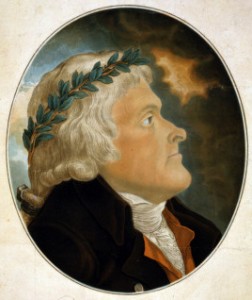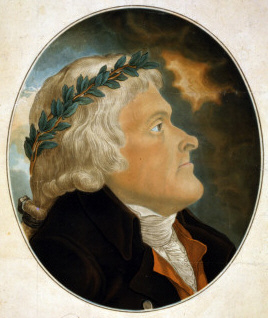“We believed … that man was a rational animal, endowed by nature with rights and with an innate sense of justice…”
 I am collecting on my page of Thomas Jefferson quotes each of the references I can find where he makes a statement that seems directly or indirectly to be a statement of Epicureanism. I’ve just found a new reference, albeit brief, to “man’s innate sense of justice,” which I have added to the page and reproduce here in full. The subject of “anticipations” is complex, but I believe very worthy of study. Here’s the quote (divided into several paragraphs for readability):
I am collecting on my page of Thomas Jefferson quotes each of the references I can find where he makes a statement that seems directly or indirectly to be a statement of Epicureanism. I’ve just found a new reference, albeit brief, to “man’s innate sense of justice,” which I have added to the page and reproduce here in full. The subject of “anticipations” is complex, but I believe very worthy of study. Here’s the quote (divided into several paragraphs for readability):
Thomas Jefferson to Justice William Johnson 12 June 1823
… I learn … with great pleasure that you have resolved on continuing your history of parties. Our opponents are far ahead of us in preparations for placing their cause favorably before posterity. Yet I hope even from some of them [for] the escape of precious truths, in angry explosions or effusions of vanity, which will betray the genuine monarchism of their principles. They do not themselves believe what they endeavor to inculcate: that we were an opposition party, not on principle, but merely seeking for office. The fact is, that at the formation of our government, many had formed their political opinions on European writings and practices, believing the experience of old countries, and especially of England, abusive as it was, to be a safer guide than mere theory.
The doctrines of Europe were that men in numerous associations cannot be restrained within the limits of order and justice but by forces physical and moral, wielded over them by authorities independent of their will. Hence their organization of kings, hereditary nobles, and priests. Still further to constrain the brute force of the people, they deem it necessary to keep them down by hard labor, poverty, and ignorance, and to take from them, as from bees, so much of their earnings as that unremitting labor shall be necessary to obtain a sufficient surplus barely to sustain a scanty and miserable life. And these earnings they apply to maintain their privileged orders in splendor and idleness, to fascinate the eyes of the people and excite in them a humble adoration and submission, as to an order of superior beings. Although few among us had gone all these lengths of opinion, yet many had advanced, some more, some less, on the way. And in the convention which formed our government, they endeavored to draw the cords of power as tight as they could obtain them, to lessen the dependence of the general functionaries on their constituents, to subject to them those of the states, and to weaken their means of maintaining the steady equilibrium which the majority of the convention had deemed salutary for both branches, general and local. To recover, therefore, in practice, the powers which the nation had refused, and to warp to their own wishes those actually given, was the steady object of the federal party.
Ours, on the contrary, was to maintain the will of the majority of the convention and of the people themselves. We believed, with them, that man was a rational animal, endowed by nature with rights and with an innate sense of justice; and that he could be restrained from wrong and protected in right by moderate powers confided to persons of his own choice and held to their duties by dependence on his own will. We believed that the complicated organization of kings, nobles, and priests was not the wisest nor best to effect the happiness of associated man; that wisdom and virtue were not hereditary; that the trappings of such a machinery consumed by their expense those earnings of industry they were meant to protect, and, by the inequalities they produced, exposed liberty to sufferance. We believed that men enjoying in ease and security the full fruits of their own industry, enlisted by all their interests on the side of law and order, habituated to think for themselves and to follow their reason as their guide, would be more easily and safely governed than with minds nourished in error and vitiated and debased, as in Europe, by ignorance, indigence, and oppression.
The cherishment of the people, then, was our principle, the fear and distrust of them that of the other party. Composed, as we were, of the landed and laboring interests of the country, we could not be less anxious for a government of law and order than were the inhabitants of the cities, the strongholds of federalism. And whether our efforts to save the principles and form of our Constitution have not been salutary, let the present republican freedom, order, and prosperity of our country determine. History may distort truth, and will distort it for a time, by the superior efforts at justification of those who are conscious of needing it most. Nor will the opening scenes of our present government be seen in their true aspect until the letters of the day, now held in private hoards, shall be broken up and laid open to public view. What a treasure will be found in General Washington’s cabinet when it shall pass into the hands of as candid a friend to truth as he was himself! When no longer, like Caesar’s notes and memorandums in the hands of Anthony, it shall be open to the high priests of Federalism only, and garbled to say so much and no more as suits their views! …
The original objects of the Federalists were, 1st, to warp our government more to the form and principles of monarchy, and, 2d, to weaken the barriers of the state governments as coordinate powers. In the first they have been so completely foiled by the universal spirit of the nation that they have abandoned the enterprise, shrunk from the odium of their old appellation, taken to themselves a participation of ours, and under the pseudo-republican mask are now aiming at their second object and, strengthened by unsuspecting or apostate recruits from our ranks, are advancing fast towards an ascendancy. I have been blamed for saying that a prevalence of the doctrines of consolidation would one day call for reformation or revolution. I answer by asking if a single state of the union would have agreed to the Constitution had it given all powers to the general government? If the whole opposition to it did not proceed from the jealousy and fear of every state of being subjected to the other states in matters merely its own? And if there is any reason to believe the states more disposed now than then to acquiesce in this general surrender of all their rights and powers to a consolidated government, one and undivided? …

